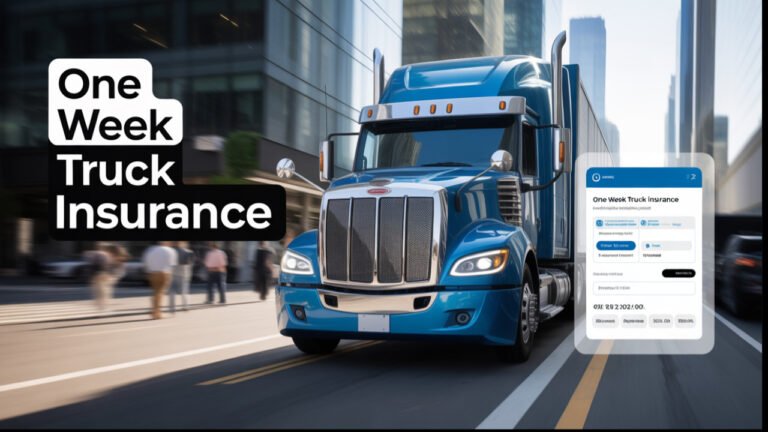Can a short-term commercial policy really give you full protection without a long commitment? This question matters if you need fast cover for a specific job, a test run, or a gap between policies.
You can get a temporary policy that mirrors the core protections of a standard plan: liability for third parties and physical damage for your vehicle. Prices for 24–72 hour terms often run higher per day than monthly plans, so you should weigh cost versus convenience.
When you have your CDL, VIN, cargo details, and route ready, many providers let you bind quickly and produce a certificate of coverage. Short-term options can fit single jobs, but be careful with “buy and cancel” tactics — they often trigger earned premium rules and underwriting flags.
Key Takeaways
- Temporary coverage can match key protections of a standard policy without a long term.
- Per-day pricing may rival a monthly premium for some vehicle classes.
- Be ready to bind: CDL, VIN, cargo, and route speed the process.
- Avoid buy-and-cancel moves that may raise future underwriting issues.
- Choose multi-day terms or flexible policies if your schedule could slip past seven days.
Buyer’s Guide Overview: Short-Term Commercial Truck Coverage in the United States
Start by matching your immediate commercial need to the short-duration placements that actually exist in the U.S. market. Clarify whether you are moving a newly purchased vehicle, covering a replacement during repairs, or hauling a single load.

This guide helps you compare policies, costs, and insurers quickly. You will see realistic formats—24–72 hour, five-day, and short bridge terms—and what documents deliver an accurate quote.
Your use case and commercial intent today
Define who will drive, the cargo, and the route. These facts cut quoting time and reduce surprises when you bind a policy.
How this guide helps you compare policies, costs, and insurers
Compare liability limits, deductibles, and add‑ons such as uninsured motorist and medical payments. Learn when non-owner options or adding a driver to an employer policy is feasible.
| Placement | Typical Term | Best Use |
|---|---|---|
| 24–72 hour | 1–3 days | Single-load hauls, deliveries |
| Five-day | 3–7 days | Short repairs or test jobs |
| Weekly bridge | Up to 14 days | Gap coverage while securing longer policy |
- Prepare CDL, VIN, cargo details, and prior policy info to get insurance fast.
- Ask about earned premium, exclusions, and certificate timelines before you bind.
One Week Truck Insurance: What It Is and How It Works
Short-duration commercial cover rarely follows a strict seven‑day calendar. State filing rules and 10–30 day cancellation notices make true weekly placements uncommon with traditional carriers.
Specialized insurers compress underwriting and billing to offer 24, 48, 72 hour, and five‑day packages. These short‑term policies include core protections: liability for bodily injury and property damage and optional physical damage cover like collision and comprehensive.

How multi-day and bridge terms differ from standard plans
Standard plans usually run six to 12 months. Short formats act as bridge cover when you switch carriers, await registration, or need immediate protection for a delivery.
Underwriting for brief terms focuses on driver record, route, and cargo since there’s little time to adjust pricing after binding. Certificates are issued fast to meet broker or shipper requests.
Choose the right format
- Single‑day or 24–72 hour: best for tight pickups and short hauls.
- Five‑day packages: useful for short repairs or test runs.
- Bridge terms: span a week or more when papers or longer policies are pending.
| Format | Typical Term | Best Use |
|---|---|---|
| Single day / 24 hours | 1 day | Immediate pickup or transfer |
| 24–72 hours | 1–3 days | Short transit, single delivery |
| Five‑day package | 3–7 days | Repairs, test driving, short contracts |
| Bridge term | Up to 14 days | Switching carriers or awaiting documents |
Before you bind, check deductibles and limits. Map your route against available terms to avoid gaps if delays push your schedule past the bound days.
When You Should Consider Short-Term Truck Insurance
Short-duration coverage makes sense when a specific job or gap needs legal commercial protection for a limited time.
Use a short placement for seasonal runs such as harvest hauling or landscaping when year‑round premiums would sit idle. This saves money and gives you targeted protection for the job.
If a shipper or broker asks for proof of liability and physical damage before a move, bind a policy for a single-load delivery. That prevents contract delays and meets carrier requirements quickly.
Other common uses
- Move a newly purchased vehicle home or cover a temporary replacement while your main unit is in the shop.
- Test commercial work like short-haul delivery or furniture moves without committing to long policies.
- Bridge a gap when switching carriers so you avoid lapses between effective dates.
Practical tips: Document route, cargo, and pickup timing in advance. Screen drivers and check MVRs because a single driver issue can block a placement. Select limits that cover potential injury, accident, or property exposure while keeping the term cost‑conscious.
Coverage You May Need: Liability, Physical Damage, and Required Add‑Ons
Decide which coverages matter most for the cargo, route, and driver before you bind a short placement.
Begin with liability to cover bodily injury and property damage if you are at fault in an accident. Align limits with state rules and the shipper’s requirements so certificates clear contract checks quickly.
Collision covers repairs when you hit another object or roll over. Comprehensive handles non-collision perils: theft, vandalism, hail, or falling debris. Together these protect your vehicle and reduce out-of-pocket repair cost.
Bare minimums and common add‑ons
- Check state-required uninsured/underinsured motorist and medical payments—these can be mandatory even for short terms.
- Balance deductible and premium: higher deductible lowers the short-term price but raises your exposure after a loss.
- Confirm cover for tools, tarps, and personal effects or add endorsements if needed.
- Ask whether towing, rental reimbursement, or roadside service apply on brief policies.
| Coverage | What it pays | Why it matters for short terms |
|---|---|---|
| Liability (BI/PD) | Bodily injury and property damage to others | Meets shipper/state requirements; essential certificate limits |
| Collision | Repair or replace after an at-fault crash | Protects vehicle value on a high-risk route |
| Comprehensive | Theft, vandalism, weather damage | Guards against non-collision losses during stops or storage |
| UM/UIM & Medical | Injury costs from uninsured parties and medical bills | Often required by state law; protects drivers and passengers |
Before you bind, confirm the certificate lists all holders and shows the right limits. Ask how glass, comprehensive-only events, and downtime are adjusted so a covered loss doesn’t surprise your bottom line.
Availability Reality Check: Short-Term Policies vs. Buy-and-Cancel Strategies
Short-duration commercial cover is far more common at specialty firms than with major carriers.
Major companies rarely offer honest daily or five‑day commercial policies. When you need flexible term options, niche insurers are the usual source.
Commercial insurers that offer true short-term options
Look to firms such as National Independent Truckers Insurance Company and Classic Truck Insurance for 24–72 hour and five‑day placements. These insurers publish clear short terms and can often issue certificates fast.
Minimum earned premium, cancellation flags, and refund expectations
Buying a standard monthly policy then canceling can trigger a minimum earned premium. That means the company keeps a set portion of the payment even if you cancel soon after binding.
Ask for refund timing, admin fees, and how refunds are prorated. Also confirm whether after-hours binds and instant certificates are supported for time‑sensitive loads.
- Prefer declared short terms from niche companies for transparency and cleaner records.
- Document cancellation rules in writing at bind to avoid surprises.
- Plan contingency dates so a late delivery does not leave you uncovered or create a claims complication.
| Issue | Typical outcome with niche insurer | Typical outcome with standard company |
|---|---|---|
| Availability of 24–72 hr terms | Usually available and documented | Rare; not commonly offered |
| Minimum earned premium if canceled | Clear percentages disclosed up front | Often retained; rules vary and may penalize early cancel |
| Certificate speed | Can be instant or same‑day | May require underwriting and longer wait |
| Underwriting flag risk | Lower when using declared short term | Higher if buy-and-cancel pattern appears |
What One Week Coverage Can Cost Right Now
Short-duration commercial coverage often looks expensive when you compare daily rates to a monthly plan.
Use real quotes as a benchmark. National Independent Truckers Insurance Co. lists typical prices: $140 for 24 hours, $240 for 48 hours, $340 for 72 hours, and $540 for a five‑day placement.
Compare that to a standard commercial car policy from larger firms such as The Hartford, which often runs about $150–$500 per month depending on industry, vehicle class, cargo, and driving history.
Why short terms can rival or exceed a monthly price
- Underwriting compression: fast binds mean higher admin fees and risk loading.
- Limited competition in true short markets keeps daily rates elevated.
- Required endorsements and certificate fees add to the upfront cost.
Factors that move your quote
| Factor | How it affects price | What to check |
|---|---|---|
| Vehicle class & value | Higher class or value raises premium | Confirm class code and stated value |
| Cargo type | Hazardous or high‑value loads increase cost | List cargo and packaging details on the quote |
| Route & miles | Longer or riskier routes lift the rate | Map route and stop counts before binding |
| Driver record | Recent violations or losses raise premiums | Provide clean MVRs to get better terms |
Get multiple quotes and weight daily cost against potential exposure. If the projected exposure lasts past the bound days, a standard policy may be cheaper and safer for future renewal ratings.
How to Get Insurance for a Week: Step-by-Step
Gather the right documents first so you can secure a short commercial policy fast.
Collect core details: CDL, VIN or registration, route plan, cargo description, and prior policy history. These facts make quotes accurate and speed binding.
Request quotes from multiple companies or brokers. Provide the same information to each to compare limits, deductibles, and admin fees fairly.
- Verify driver eligibility and territorial limits up front.
- Confirm effective and expiration dates so coverage spans loading, transit, and delivery.
- Assess endorsements, limits, and total premium including fees.
Bind coverage once you pick the best policy. Ask for certificates, additional insured wording, and digital ID cards immediately.
Get written cancellation terms that show minimum earned premium and refund timing. Save all confirmations and set reminders for the expiration date.
| Step | Action | Why it matters |
|---|---|---|
| Prepare details | CDL, VIN, route, cargo, prior policy | Ensures accurate quote and faster bind |
| Compare quotes | Same details to multiple companies | Shows true price and required endorsements |
| Bind & confirm | Issue certificates and digital ID | Meets shipper/broker proof needs |
| Document cancel | Written refund and earned premium terms | Prevents surprises if plans change |
Where to Shop and What to Ask Each Insurance Company
Prioritize insurers who can show specimen policy language and same‑day certificates for quick deliveries. Focus your search on niche providers that explicitly advertise 24–72‑hour and five‑day car and commercial policies rather than forcing a standard product into a short slot.
Niche providers to consider
Look at National Independent Truckers Insurance Company for 24–72‑hour and five‑day placements. Classic Truck Insurance also lists temporary and non‑trucking liability options. These firms document short terms clearly and can often issue digital proof fast.
Key questions to ask every company
- Exclusions: Request a clean list—restricted cargo, ineligible routes, and MVR thresholds.
- Deductibles: Confirm liability versus physical damage deductibles and any separate collision/comprehensive amounts.
- Territory: Verify state lines, interstate coverage, and stop locations for the full route to delivery.
- Claims handling: Ask about after‑hours filing, adjuster response times, and emergency contact names.
- Fees & endorsements: Get all policy, endorsement, and admin fees in writing and request specimen policy pages.
| What to get | Why it matters | Ask for |
|---|---|---|
| Specimen language | Clarifies exclusions and duties | Policy excerpt or sample |
| Certificate speed | Meets broker/shipper deadlines | Same‑day or instant digital proof |
| Claims contact | Speeds resolutions for time‑sensitive freight | Direct phone and email for a person |
Smart Alternatives If You Need Temporary Protection
If your work is sporadic, pay‑as‑you‑go programs can cut premiums by billing for actual miles driven. These options give you flexible protection without the per‑day markup of a short placement.
Pay-as-you-go and usage-based policies for low-mileage work
Pay‑per‑mile and telematics plans price by miles or hours. They suit occasional runs and yard moves.
When your routes are short, telemetry can lower the overall cost and keep vehicle insurance costs aligned with actual use.
Standard commercial auto with flexible cancellation — pros and cons
A standard six‑month policy may offer partial refunds on early cancellation. This can be cheaper if you expect work to span multiple months.
But monthly or multi‑month policies may keep more coverage types, like collision and comprehensive, compared with minimal short placements.
Non‑owner and adding a driver to a company policy for specific jobs
Non‑owner policies provide liability while you operate vehicles you don’t own. They are useful for occasional assignments but often do not include physical damage.
Being added as a named driver on an employer or fleet policy can be quick. Check underwriting rules, residency limits, and whether cargo or territorial restrictions apply.
- Compare per‑mile or per‑term economics before you bind.
- Confirm how claims affect future quotes and standing with insurers.
- Ensure coverage stays continuous from pickup through delivery to avoid gaps.
| Option | Best for | Limitations |
|---|---|---|
| Usage‑based | Low‑mileage, sporadic runs | May require telematics; privacy concerns |
| Standard commercial | Work that may extend beyond a few days | Higher upfront cost; cancellation rules |
| Non‑owner / added driver | Occasional jobs with borrowed vehicles | Often excludes physical damage |
Conclusion
Treat short-term cover as a bridge solution that fills a specific schedule gap without forcing a long contract.
Use niche companies for 24–72‑hour and five‑day placements when you need same‑day proof. Gather CDL, VIN, cargo, and route details, then request quotes so you can get insurance fast.
Keep a strong, written record of certificates, endorsements, and cancellation rules to avoid earned premium surprises. Confirm refund and minimum earned premium before you bind.
Consider usage‑based plans, non‑owner options, or a standard commercial car policy when work extends beyond a few days. Compare offers, bind decisively, and keep continuous protection through delivery.


